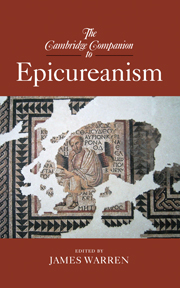Book contents
- Frontmatter
- Introduction
- 1 The Athenian Garden
- 2 Epicureanism in the Roman Republic
- 3 Epicureanism in the Roman Empire
- 4 Epicurean atomism
- 5 Epicurean empiricism
- 6 Cosmology and meteorology
- 7 Psychology
- 8 Action and responsibility
- 9 Pleasure and desire
- 10 Politics and society
- 11 Epicurean philosophy of language
- 12 Philosophia and technē: Epicureans on the arts
- 13 Removing fear
- 14 Epicurean therapeutic strategies
- 15 Epicureanism in early modern philosophy
- Bibliography
- Index
9 - Pleasure and desire
Published online by Cambridge University Press: 28 September 2009
- Frontmatter
- Introduction
- 1 The Athenian Garden
- 2 Epicureanism in the Roman Republic
- 3 Epicureanism in the Roman Empire
- 4 Epicurean atomism
- 5 Epicurean empiricism
- 6 Cosmology and meteorology
- 7 Psychology
- 8 Action and responsibility
- 9 Pleasure and desire
- 10 Politics and society
- 11 Epicurean philosophy of language
- 12 Philosophia and technē: Epicureans on the arts
- 13 Removing fear
- 14 Epicurean therapeutic strategies
- 15 Epicureanism in early modern philosophy
- Bibliography
- Index
Summary
Pleasure is the goal of life for an Epicurean. But it is pleasure of a particular kind that represents this goal, namely lack of pain in body (aponia) and lack of distress in soul (ataraxia). It is clear that, for Epicurus, to be free from bodily pain and mental distress is, in and of itself, to be in a state of pleasure. He does not recognize a neutral state of neither pleasure nor pain; for a percipient subject, being without pain is already pleasant. Equally, however, Epicurus does not hold that the only pleasure to be had is freedom from pain. The pleasures of the profligate, which he tells us do not represent the Epicurean goal (Ep. Men. 131), certainly are pleasures as far as Epicurus is concerned, since he calls them that, though he adds that such pleasures do not generate a pleasant life - it is 'sober reasoning' that does so (Ep. Men. 132).
- Type
- Chapter
- Information
- The Cambridge Companion to Epicureanism , pp. 158 - 178Publisher: Cambridge University PressPrint publication year: 2009
- 13
- Cited by

